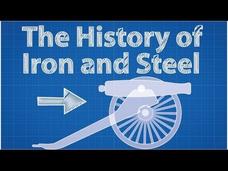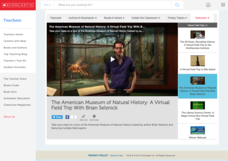Crash Course
Light
All this talk about seeing the light... but, what is it, and how do we see it? Science students learn the basics of the nature of light in a narrated video that discusses concepts such as how light behaves, the electromagnetic spectrum,...
Crash Course
War and Civilization: Crash Course World History 205
Can war be an indication of a growing civilization? Crash Course World History explores the ways that wealth and power work together to form and defend empires throughout the history of mankind.
Math Antics
What Are Functions?
Setup the idea of functions for the class. Using sets, the presentation introduces the concept of a function. The initial example uses a general function but then moves on to equations as functions. The video provides an example of an...
MinuteEarth
How Humans Made Malaria So Deadly
Combine agriculture and an increase in population density in sub-Saharan Africa and what do you get? Malaria! Young immunologists explore malaria's deadly rise to fame in a video. The narrator discusses its beginnings as a hitchhiking...
FuseSchool
Exact Trig Values - Hand Trick
Having trouble remembering the trigonometric ratios of the common angles? Here's a video for you! The lesson instructor demonstrates a hand trick that helps individuals determine the correct trigonometric ratios. The trick works for...
Math Antics
Percents Missing Total
Is there a formula to help find the total in a percent problem? Given the part and the percent, the resource shows how to find the total. The video provides a two-step formula to find the total and goes through two word problems to...
Math Antics
Exponents in Algebra
The rules still hold. By reviewing the meaning of exponents in arithmetic, the video takes a look at exponents in algebra. The resource develops the meaning of any number raised to the zero power. Taking the idea of exponents further,...
Real Engineering
Material Properties 101
The six words you need to know to describe materials: stiff, strong, ductile, brittle, tough, and hard. Scholars learn how to investigate and describe material properties using a stress-strain graph. They identify yield strength and...
Real Engineering
Can We Create Artificial Gravity?
Is it possible to make gravity? Scholars watch a Real Engineering video that explains how it would be possible to simulate gravity on a space station. Rotation of the station is the key.
Real Engineering
Wright Brothers Didn't Invent Flight
If you thought the Wright brothers invented flight, you'd be wrong. Scholars learn how Otto Lilienthal used gliders to simulate flight before the Wright brothers. The Real Engineering video then explains how the Wright brothers perfected...
Real Engineering
Why Are I-Beams Shaped Like an I?
There's a reason why they're called I-beams. A short Real Engineering video describes why I-beams are in the shape of an I. It considers how the beam achieves maximum bending load with the least amount of material.
Real Engineering
The History of Iron and Steel
Steel a great resource to teach your class all about iron. Viewers of an engaging video see how the production of wrought iron, cast iron, and steel have changed over time. The video also explains some societal advances due to these...
PhysEdGames
Snowflakes
First choose three people to be taggers, and two players to be freers. Give each tagger a white foam ball, and give each freer a yellow ball. The rest of the class runs around the playing area. If a runner is tagged with a white ball,...
American Chemical Society
How to Make Flowers Last Longer
"Nature's first green is gold, Her hardest hue to hold. Her early leaf's a flower; But only so an hour." - Robert Frost. An engaging video in the ACS Reactions playlist explains six steps that people can take to make flowers last longer....
American Chemical Society
Zika, Mosquitoes and How to Not Get Bitten
How did Zika virus spread so quickly? An informative video in the ACS Reactions explains how mosquitoes transmit the Zika virus. Scholars also learn how the virus affects the body and how to avoid being bitten by mosquitoes.
American Chemical Society
Why Does Metal Rust?
Are your learners' oxidation skills a little rusty? Shake it off using an informative and engaging resource. Scholars view a video in the ACS Reactions channel to learn why metals rust. They see how oxidation and reduction (redox)...
Socratica
Chemistry: Percent Composition
How much oxygen is in water? Is it the same as the chemical formula? Learners observe the differences between a substance's formula and its percent composition with a video from Socratica's Chemistry Lessons series. The narrator...
Physics Girl
Spool Riddle - Which Way Will It Roll?
Looking for a challenging brain teaser to stimulate conversation? The spool riddle will make things roll right along! The narrator of the a physics video series explains the constraints of the spool in terms of movement and friction,...
Cisco
Episode 1.3: The Solution
How can the people of Malawi get the fresh drinking water they need? The third episode in a seven-part series shows the Global Problem Solvers as they put their heads together and use technology to upgrade the country's system of wells....
PBS
Death Dive to Saturn — Saturn’s Dynamic Rings
Explore the rings of Saturn! Space scholars discover the immense Saturn system through an interactive lesson. The activity, part of PBS's Space series for grades six through eight, features images captured by the Cassini spacecraft of...
Crash Course
Pee Jokes, the Italian Renaissance, Commedia Dell'Arte: Crash Course Theater #12
Welcome to the Renaissance, known as one of the most vibrant periods in the world of theater. An informational video provides a thorough overview of the period, noting key changes that took place on the stage. After a lengthy discussion...
Crash Course
The Harlem Renaissance: Crash Course Theater #41
Artists shattered stereotypes during the Harlem Renaissance. Video 41 on the Crash Course Drama and Theater playlist describes art and theater during the time period with a focus on Broadway plays and musicals written by...
Howard Hughes Medical Institute
The Proteasome
How do cells get rid of worn out proteins? Using a short video clip, viewers learn about the role of ubiquitin in flagging worn-out proteins and see how the proteasome degrades flagged proteins.
Scholastic
The American Museum of Natural History: A Virtual Field Trip with Brian Selznick
Author Brian Selznick takes scholars on a virtual field trip to New York City's American Museum of Natural History. Three stops to the Hall of North American Mammals, Mosquito Model, and Hall of Meteorites showcase prominent dioramas and...
Other popular searches
- Promotional Mix
- Campaign Promotional Materials
- Promotional Products
- Promotional Video
- Promotional Design
- Promotional Materials
- Promotional Activities
- Product Promotional
- Promotional Advertising
- Marketing Promotional Mix
- Promotional Writing
- Promotional Items

























